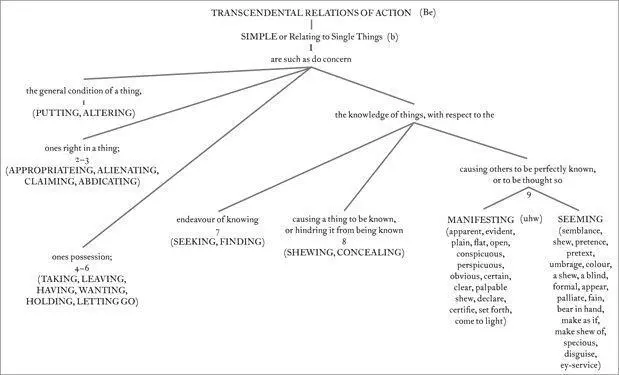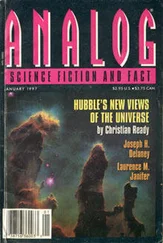Figure 7.1: Category IV (Discourse), subcategory III–condensed
But some of the synonyms he lists are not strictly equivalent to the headword. “Explicate” is related to “plain,” but it is not quite the same. He intended these partial synonyms to be derived from the basic word by adding something he called “transcendental particles.” So “explicate” would be something like bilguhwwa —the addition of - wa at the end signifies “cause,” and the addition of the I after the first vowel signifies “the active voice.” To explicate is “to act to cause to be plain.” In any case, all the words listed at a particular position in the table are supposed to somehow express the same concept.
Here, “plain,” in its sense as the opposite of “obscure,” was listed with some synonyms that made me feel I had found the right place. I could substitute “evident” or “obvious” into my translation and feel pretty good about it: “It is evident that there is no classification of the universe.” “It is obvious that there is no classification of the universe.” Both of these seemed to mean the same thing as the original. Still, I took a look at “manifest,” just to be sure.
“Manifest” was located at TA.I.9 (transcendental relations of action > belonging to single things > pertaining to the knowledge of things, as regards the causing to be known). Figure 7.2 shows it in relation to the rest of its sub-table (condensed).
“Manifesting” (or bebuhw ) also seemed to capture the sense I was after (and also included the synonyms “evident” and “obvious”). So which one would be best for this translation? Do I want to say, “It is [a feature of discourse in terms of its complex grammatical notions concerning the signification of words, with regard to their understandability, being the opposite of obscure] that there is no classification of the universe not being arbitrary and full of conjecture”? Or is it better to say, “It is [a transcendental relation of action belonging to single things pertaining to the knowledge of things, as regards the causing to be known, being the opposite of seeming] that there is no classification of the universe not being arbitrary and full of conjecture”? Is there any difference between these two? What was this sentence supposed to mean again? Wait, what does “clear” even mean?

Figure 7.2: Category III (Transcendental Relations of Action), subcategory I—condensed
To get it right in Wilkins’s system is not just to discover how words correspond to other words, but to discover the true meaning of a word. The synonyms he lists are just other English words, with all their little defects and redundancies; it is the position in the table that really matters. It is the position that is meaning. I could see that “clear” corresponded to “evident” or “obvious,” but I couldn’t really say what it meant . I was losing my grip on the simple word “clear.” Only one word into my translation and my solid understanding of English was unraveling in my hands.
I took a break. Called a friend. Reassured myself that I could still speak English.
Then I returned to the original quotation (actually, the original original is in Spanish, and Borges uses notoriamente , “notably,” rather than es claro , “it is clear,” but let’s not even get into that). What does he mean to say? There is no classification of the universe that is not arbitrary and full of conjecture. All you have to do is look around a bit and you will come to this conclusion too. Not because these words are easy to understand (discourse > signification of words > not obscure), but because this is the conclusion the facts reveal to you (transcendental > causes itself to be known).
Yes, yes. I started to feel steady again. It was the second meaning, “manifest,” that best captured the intention of “clear” in this case. I felt more than steady—satisfied, in fact. It was a particular kind of satisfaction, the kind you feel when you’ve finally wrangled control over a wide range of linguistic shade and nuance. It was a familiar feeling. Where did I know it from …?
Then it hit me; I was using a thesaurus. Wilkins, without intending to, had invented the thesaurus.
I pulled down the old Roget’s and turned to “clear.” I perused the long list of senses, from “acquit” to “transparent” to “audible.” Wilkins had covered them all.
Now I must make an admission. I have always used a thesaurus in the way that most people use one. You go to the alphabetical index, look up a word, find some synonyms, and pick the one that best expresses the sense you’re going for. If you don’t see something you like, you look at the little number next to the closest sense, turn to the numbered list, and find more alternatives to choose from. You make a choice, stick it in your sentence, and close the book until next time.
I never gave a thought to how the numbered list was organized. I never even thought about whether it was organized. But of course it has to be. The words near each other in this list are related in meaning. There must be some basis for considering them related.
That basis, it turns out, is a conceptual classification not all that different, in raw outline, from that proposed by Wilkins. My thesaurus, Roget’s International Fourth Edition , groups words into eight major classes (physics and sensation were added, in later editions, to the six originally provided for by Roget):
* abstract relations
* space
* physics
* matter
* sensation
* intellect
* volition
* affections
Each of the major groups is further divided into sub- and sub-subcategories. There are ten kinds of abstract relations, three kinds of matter. “Beauty” is under affections. It is a personal affection, a discriminative one. “Truth” is under intellect. It is an intellectual faculty, a conformity to fact.
And guess where “shit” is? When I looked for this word in Wilkins’s table, I had expected to find it grouped with corporeal actions, but was surprised to find it under motion instead (a purgatory motion, from the guts downward)—another example of Wilkins’s charmingly arbitrary and absurd categorization scheme. In the thesaurus I thought it might be under organic matter, but instead I found it listed under class two > subclass IV > sub-subclass D > 311. Which is to say, space > motion > motion with reference to direction > excretion. Here, too, “shit” is classed under directional motion. Arbitrary? Yes. Absurd? Perhaps. But also—importantly—useful.
Usefulness is all the thesaurus demands of its classification system. It should be useful to someone who is trying to find a word. It should group words with other words in a way that will help a person locate the one that most accurately expresses a particular meaning.
But it does not need to explain that meaning. It assumes you already know it (when this assumption fails, a thesaurus can be a dangerous thing, as anyone who has ever graded a freshman essay can attest). The classification is useful, but not definitive. What you come away with at the end of a session with a thesaurus is not a meaning but a word, a plain old imprecise English word. It means whatever it means because, well, that’s what English speakers generally use it to mean. At the end of the day, shit is not an excretory downward motion; shit is that thing we mean when we say “shit.”
Wilkins’s classification, on the other hand, was meant to be definitive. You use it to produce not an English word but a universal word. A word that bypasses messy human languages and gets right to the concept. Shit is not “shit” but cepuhws . And cepuhws is … Well, perhaps it’s time for me to restore a little dignity to the discussion here.
Читать дальше













